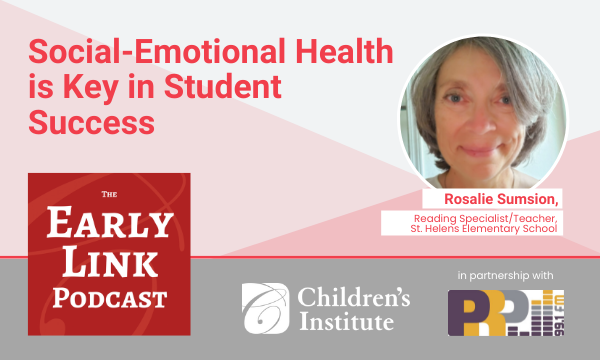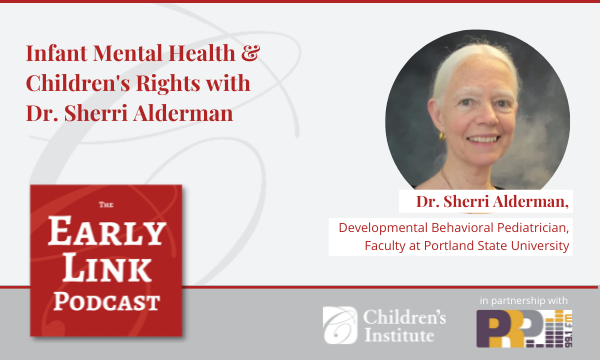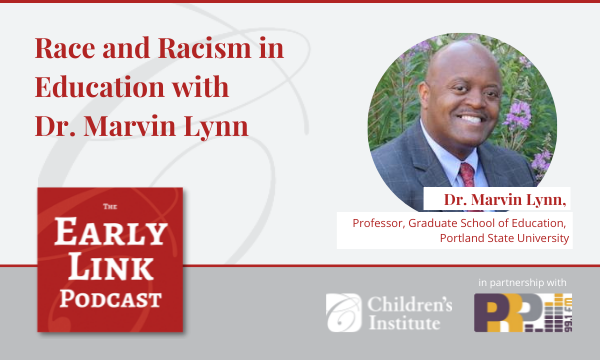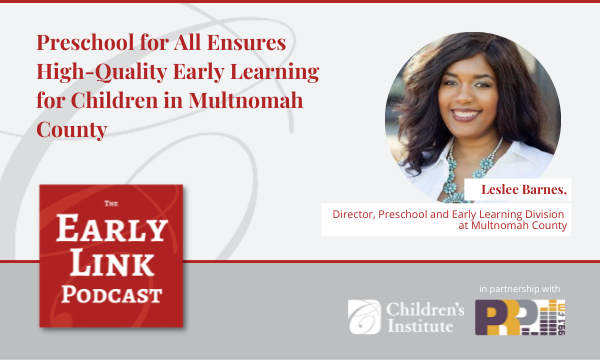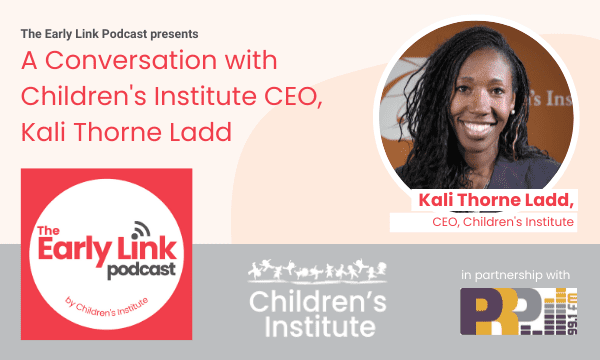
A Conversation with Children’s Institute’s CEO, Kali Thorne Ladd
Guest
In this episode of the Early Link Podcast, we talk to Kali Thorne Ladd, Chief Executive Officer here at Children’s Institute. She has an extensive track record of working in early childhood and was co-founder and former executive director of Kairos PDX. As a leader in multiple positions, Thorne Ladd works to transform early learning and healthy development for children and families in Oregon. This has included serving as the chair of the board for Portland Community College, serving on Governor Brown’s Early Learning Council, and serving on the board at the James F. and Marion L. Miller Foundation based in Portland.
Summary
In this episode, Thorne Ladd starts with a poem by Clint Smith, from his book Counting Descent, and talks about its significance as it relates to her work in education and social justice. She believes that, “all of us would be better if we paid attention to [children] and learned from them.” She also touches on how and why she has devoted her career to the well-being of children, and discusses some of the big changes happening at Children’s Institute, which includes a new mission and vision statement with an emphasis on justice for children. As the new mission, vision, and values take hold, Thorne Ladd gives listeners an idea of what it means to live into these ideas and how there are complex moving parts within the early childhood system that will always need to be addressed.
Transcript
[00:00:00] Kali Thorne Ladd: It is early December in Cambridge and the Charles River has crystallized into a glimmering pane of fresh glass. Not yet strong enough to stand on, but beautiful enough to watch from the bridge above. The bridge’s subtle arc encrusted in an overlay of white, a small child dawdling across with adult in hand, little joints fixed in place by the four layers of clothes on her body, a swaddle of stiff limbs. When she first sees the snow, she becomes overwhelmed with joy, slips away to chase the bits of sky, tottering a few feet before tumbling under the weight of her own elation. She rolls her small body, becoming an avalanche unto itself. Squeals of laughter growing with each rotation. I watch the woman, her mother, perhaps, dart anxiously after the rolling bundle, checking for cuts, scratches, bruises, signs of distress, but the child is still laughing. Undeterred by blood, gets back on her feet, waiting for the next slice of sky worth chasing. That’s by Clint Smith from his book, Counting Descent.
[00:01:10] Rafael Otto: This is the Early Link Podcast. Thanks for tuning in. My name is Rafael Otto. You can catch us every Sunday on 99.1 FM in the Portland Metro at 4:30 PM. Tune in there when you can, or you can find us wherever you find your podcasts, including iTunes, Spotify, Amazon Music, streaming on our website at childinst.org. That was my colleague, Kali Thorne Ladd:. She is the Chief Executive Officer at Children’s Institute. That was a poem that she chose to read today. And I want to ask you about that, but welcome to the podcast. It’s so good to have you on.
[00:01:48] Kali Thorne Ladd: Thank you for having me.
[00:01:49] Rafael Otto: Kali you’ve been, uh, you are the CEO here at Children’s Institute. You have a long track record of working in early childhood, you were a co-founder and executive director at Kairos PDX. I’m not going to read the rest of your bio, but people can learn more about you if they like. Welcome. It’s great to have you here. Tell me a little bit about that poem and why you chose to read that one today.
[00:02:13] Kali Thorne Ladd: Well, I think all of the work I do is because I believe in children. I believe in their brilliance, their beauty, their assertive, innate, belief in possibility that I think all of us can benefit from as adults. And I think this poem captures that well. Clint Smith is an educator, he is a black educator who is also a believer in education as a civil right, and part of the social justice movement.
And so him as author, I thought was important, but you know, I read through his book of poems. This is his first book of poems. He’s written other things since, but I just found this one so beautifully encapsulated children in their natural element and their natural beauty. And this child could be any child. If we give children the chance to be themselves. We see beautiful things.
[00:03:07] Rafael Otto: Tie that into some of the work that you’ve done in the past or how you’re thinking about the work here at CI.
Please download the full transcript below.

